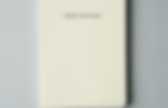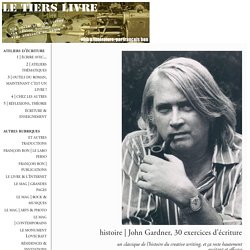

John Gardner, 30 exercices d'écriture. Let us suppose the writer has mastered the rudiments.

How should he begin on fiction ? What should he write about, and how can he know when he’s done it well ? J.G. Est-ce que nous viendrions encore aujourd’hui à John Gardner si un de ses élèves en creative writing, Raymond Carver, ne lui avait pas rendu un magnifique hommage, pour ce qu’il lui devait ? Probablement que si. Et que son Art of fiction (1983, presque rien...), sous-titré donc « notes sur le métier, à l’attention des jeunes auteurs », est directement dédié « à mes collègues enseignants de creative writing », et c’est même ce que je proposerais de vraiment prendre au sérieux. La démarche de Gardner est profondément rigoureuse et respectueuse. Why Walking Helps Us Think. In Vogue’s 1969 Christmas issue, Vladimir Nabokov offered some advice for teaching James Joyce’s “Ulysses”: “Instead of perpetuating the pretentious nonsense of Homeric, chromatic, and visceral chapter headings, instructors should prepare maps of Dublin with Bloom’s and Stephen’s intertwining itineraries clearly traced.”

He drew a charming one himself. Several decades later, a Boston College English professor named Joseph Nugent and his colleagues put together an annotated Google map that shadows Stephen Dedalus and Leopold Bloom step by step. The Virginia Woolf Society of Great Britain, as well as students at the Georgia Institute of Technology, have similarly reconstructed the paths of the London amblers in “Mrs. Dalloway.” Such maps clarify how much these novels depend on a curious link between mind and feet. Creative Writing 101.
RJ Great article. Morning is definitely the time where I am most creative. I think it’s because my mind is the freshest and the least cluttered at this time of day. Doug Rosbury When I write, it is with an emphasis on the sharing of wisdom arising from my life experience. Wether one could reasonably term such writing as being creative or not I don’t necessarily concern myself with.
The creative aspect which I believe is part of a writing nevertheless may be found in how I address people with careful consideration regarding how I may come across to them. National Novel Writing Month. Débuter son intrigue par la fin. C’est une réalité certes amère mais trouver une idée d’histoire, voire deux, ou même quarante-cinq, ne fera pas de vous un romancier ou scénariste.

Etre auteur professionnel consiste à pouvoir développer une idée originale en une intrigue complexe susceptible de trouver une audience. Maîtriser les règles de la dramaturgie ne suffit pas toujours pour mettre sur pied certaines de vos idées, parfois « ça bloque ». On sait pertinemment qu’on tient un concept en or mais on a beau le retourner dans tous les sens, impossible d’en dégager une structure efficace. Je viens de tomber sur une méthode de déblocage conçue pour le storytelling 2.0 mais qui s’applique à merveille à d’autres formes de récits, ça vous intéresse? Je vous ai livré une méthode pour mettre à l’épreuve vos idées d’histoire, à savoir la rédaction d’un squelette, mais supposons que vous n’y parveniez pas tout en restant persuadé(e) que votre idée est géniale et mérite qu’on lui accorde une chance.
Voici les étapes du processus: 27 Pieces Of Advice For Writers From Famous Authors. Places to Write In London. Location London Yelping Since January 2009 Things I Love curtains, dancing, drunk, cats in clothes, teapots, rice with raisins in it, Snow Days, squirrels, wearing floral dresses, Dolly Parton, red OPI nail polish, dragons Find Me In floral My Hometown Where the chavs are cheap and the booze is cheaper My Blog Or Website meow-london.blogspot.com When I'm Not Yelping...

I'm looking for Alan Why You Should Read My Reviews I'm short and ginger and need the support My Second Favourite Website misternicehands.com The Last Great Book I Read had more pictures than words in it My First Concert too embarassing to say so best one is Mars Volta at the Roundhouse 2008.
Screenwriting. Ten rules for writing fiction. Elmore Leonard: Using adverbs is a mortal sin 1 Never open a book with weather.

If it's only to create atmosphere, and not a character's reaction to the weather, you don't want to go on too long. The reader is apt to leaf ahead looking for people. There are exceptions. If you happen to be Barry Lopez, who has more ways than an Eskimo to describe ice and snow in his book Arctic Dreams, you can do all the weather reporting you want. 2 Avoid prologues: they can be annoying, especially a prologue following an introduction that comes after a foreword. 3 Never use a verb other than "said" to carry dialogue. 4 Never use an adverb to modify the verb "said" ... he admonished gravely. 5 Keep your exclamation points under control. 6 Never use the words "suddenly" or "all hell broke loose". 7 Use regional dialect, patois, sparingly. 8 Avoid detailed descriptions of characters, which Steinbeck covered. 10 Try to leave out the part that readers tend to skip.
Diana Athill Margaret Atwood Roddy Doyle.